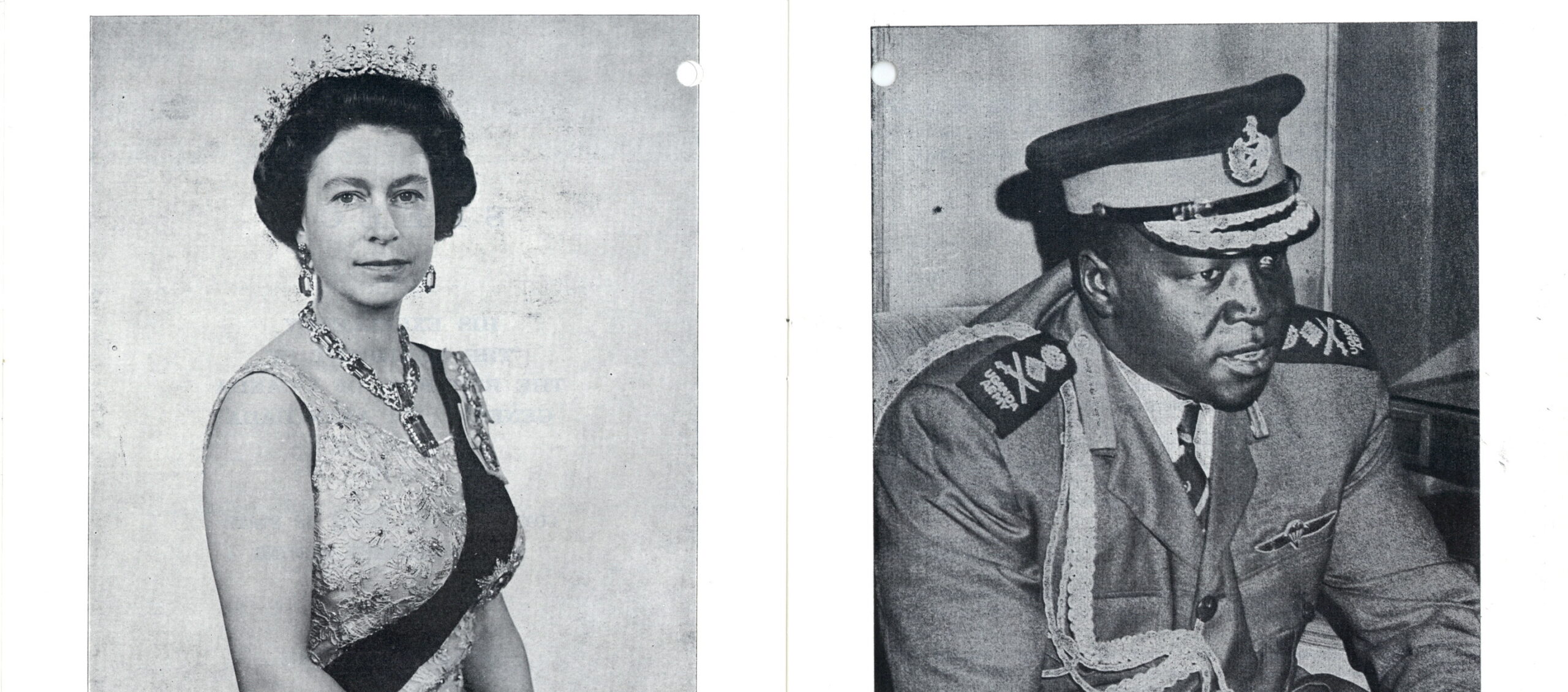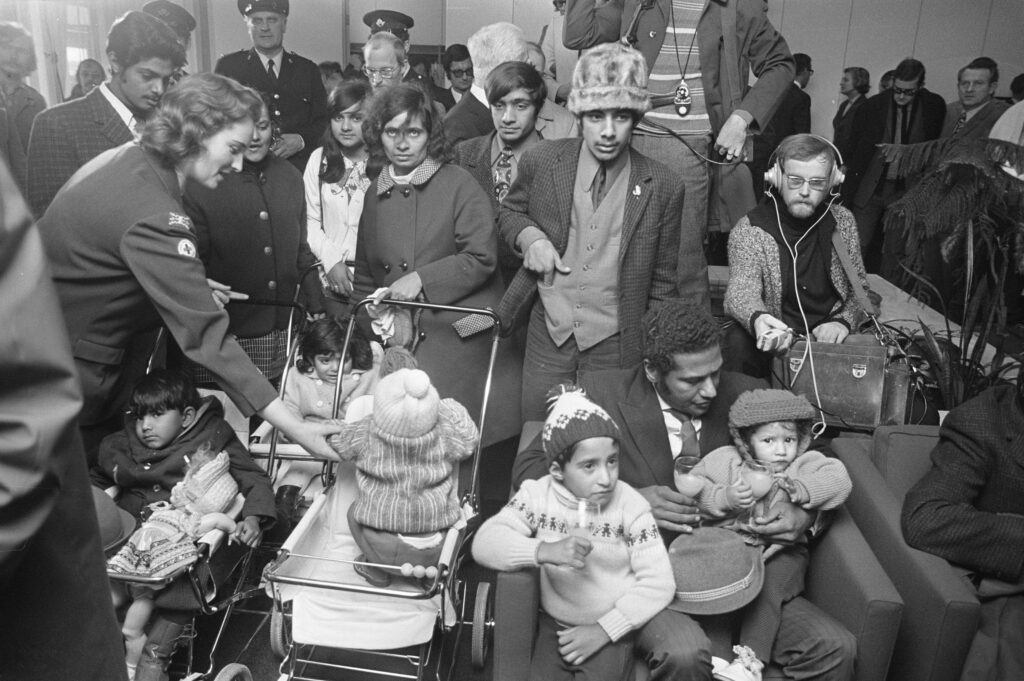
Expulsion of Ugandan Asians
On 25 January 1971, General Idi Amin overthrew the civilian government in a military coup against the Milton Obote government. On the day after the coup, Amin announced on Radio Uganda:
“Fellow countrymen and wellwishers of Uganda. I, General Amin, I address you today at a very important hour in the history of our nation. A short while ago members of the Armed Forces entrusted the affairs of the Government to me.
I am not a politician, but I am a professional soldier. I am therefore a man of few words and I shall be brief.
Throughout my professional life I have emphasised that the miltiary must support a civilian government that has the full support of the people. I have not changed from that position. Matters now prevailing in Uganda force me to take a special task. Mine will be purely a caretaker administration… free and fair general elections will soon be held.” (Uganda Argus, 26 January 1971)
Less than a month later on the 20th February, the military government announced that they will remain in power for five years with Amin serving as President. The 9th point of the 13-point declaration extending military rule stated:
“We want to remind everybody that the period of political activity has been suspended in the national interest, and everybody engaging in political activities during such period of suspension will be dealt with severely.
We say this because we are aware that Uganda’s present difficulties and most of Africa’s problems are caused by greedy and ambitious politicians. We note that some people, especially politicians in Uganda, are trying to reopen old quarrels and old wounds with a view to dividing the people of Uganda on a tribal, religious, or other sectional basis.
We want to warn strongly all people especially politicians including former detainees, that anybody preaching hatred to the people of Uganda will be an enemy of Uganda and we welcome the announcement already made by the Government to expand the Uganda Armed Forces.
This will make us better able to defend Uganda from external aggression and from internal enemies of society like kondos and those who engage in political sabotage. In this respect we wish to affirm our determination to fight and crush wondoism in ty [sic] and mutual respect.” (Uganda Argus, 22 February 1971)
In July 1971, the Ministry of Internal Affairs announced a census of persons of Asian origin to be conducted at enumeration centres across the country. The national census later took place in October of the same year. Nathan Epenu, wrote in The Uganda Argus on the eve of the census:
“In the wake of our independence, increasing pressures on the Asian communities have brought their problems to a watershed. The issues involved are sharper and clearer.
On the economic front, the Asians are being urged by our leader to decrease their dominance in commerce by co-operating with, and even sponsoring, the small African businessman, with a view of giving way either to African enterprise or state enterprise.
And on the social front, which covers a spectrum of issues ranging from the day-to-day association informally with Africans, to behaviour to a domestic servant and interracial marriages, African leaders have repeatedly said that our Asian brothers and sisters must integrate themselves with African society. By and large Asians agree, but as long as integration does not mean inter-racial marriages and forms of forced associations.
Hence, there is a serious misunderstanding in what is meant by, or involved in, integration.
But once this census clearly demarcates who is a citizen and who is not, the declared Asian citizen of Uganda might have to start taking a hard look at the practical aspects of what is really meant by being integrated into the greater population.” (Uganda Argus, October 1971)

Amin fanned the flames of racial animosity towards the prosperous Asian minority and later issued an Asian expulsion order with 90 days notice. On the 9th August 1972, a final order and signed decree on the matter was executed.
The Uganda Argus reported:
“The move, said the President, had not been motivated by racism as had been alleged in some quarters but because the Uganda Government’s primary duty is to ensure the well being of her citizens.
The President said he had convened yesterday’s meeting because he wanted to announce his final decision on the question of the Asians in Uganda.
He recalled that on August 4, this year, when he was addressing troops at Tororo, he announced the decision of his Government asking the British Government to take over responsibility for the British citizens of Asian origin living in Uganda, who were ‘sabotaging the economy of the country’ and were practising and encouraging corruption.
He further recalled that in his message on August 5 on the occasion of the Co-operative International Day he had elaborated on his announcement and made it clear that British citizens of Asian origin whose continued presence in Uganda was no longer in the country’s best interests would be given three months within which to leave the country.
‘My Government believes that one of its primary duties is to ensure the welfare of members of the community. This means, therefore, that no one section of the community can be allowed to dominate, control or monopolise the business life of the nation.
‘No country can tolerate the economy of its nation being so much in the hands of non-citizens as is the case in Uganda today.’
The Asian community, the President said, has frustrated attempts by Ugandan Africans to participate in the economy and business life of their own country.
They had refused to identify themselves with Uganda and that is why when, at the time of independence, they were offered a chance to become citizens, the majority of them turned down the offer while a few of them took out the citizenship half-heartedly, and still others retain dual citizenship.
Asians have kept themselves apart as a closed community and have refused to integrate with Ugandan Africans. Their main interest has been to exploit the economy of Uganda and Ugandan Africans. They have been milking the economy of the country by exporting illegally large sums of money from this country.” (The Argus, 10 Aug 1972)
Share this Article
Our Funders

